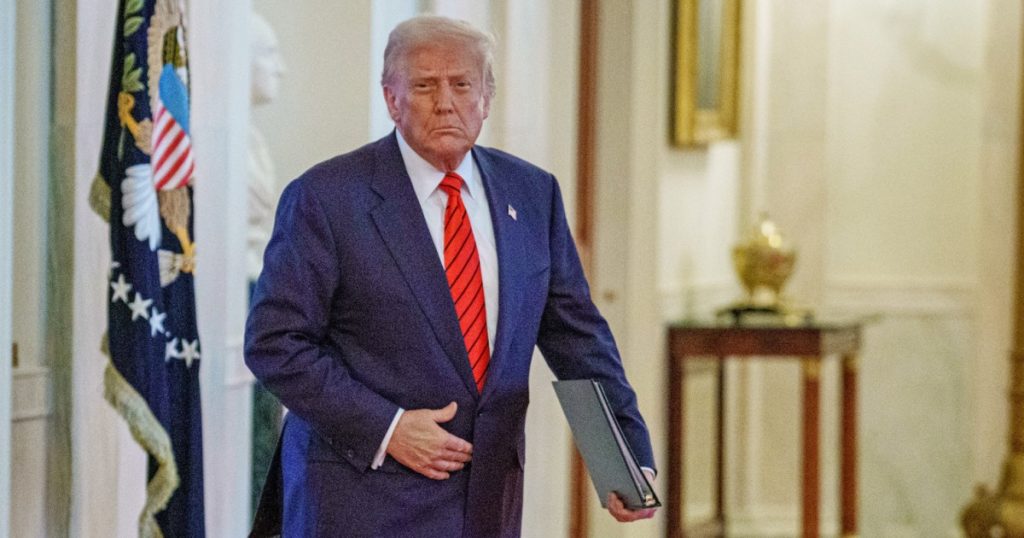The courts have become a significant barrier to some of President Donald Trump’s efforts to rapidly reduce and reform the federal government. In his early weeks in office, Trump has signed over 50 executive orders aimed at reshaping the government, ranging from targeting birthright citizenship to altering how transgender inmates are housed. These orders have also led government agencies to attempt to freeze federal funding nationwide and offer buyouts to a large portion of government employees. However, the sheer volume of these orders has triggered over two dozen lawsuits and several court decisions that have temporarily halted some of Trump’s actions. Three such decisions were released on Thursday alone. Below is a breakdown of the Trump orders that courts have blocked.
One major legal challenge involves the Department of Government Efficiency, or DOGE, created by Trump and led by Elon Musk. Retirees and union members have filed a lawsuit against the Treasury Department for allowing DOGE staff to access the federal government’s payment and collections system, which contains personal data. They argue that this violates federal privacy laws and are seeking an order to block DOGE from accessing the data and return any data already collected. The Justice Department has agreed to limit access to these systems until a full hearing on February 24. In a related case, union members filed a suit to stop DOGE from accessing confidential information from the Labor Department, but U.S. District Judge John D. Bates denied a temporary restraining order, stating that while he had concerns, the plaintiffs had not established standing. Additionally, 19 states led by New York filed a similar suit, arguing that Musk’s access to personal data is unconstitutional.
Another significant legal battle involves the U.S. Agency for International Development (USAID). On Thursday night, two unions sued the Trump administration over its efforts to dismantle USAID. At an emergency hearing in Washington, D.C., U.S. District Judge Carl Nichols agreed to pause a midnight deadline for USAID to be drastically reduced to just a few hundred workers. The ruling came just hours before 2,200 USAID employees were set to be placed on administrative leave. Nichols issued a temporary restraining order shortly before 11 p.m., delaying the implementation of the cuts.
Trump’s push to downsize the federal workforce has also faced legal hurdles. The Office of Personnel Management announced a “deferred resignation” program allowing workers to resign now but remain on the payroll until September. Labor unions sued to stop the program, arguing that the Trump administration lacks the legal authority to offer such buyouts. A federal judge in Boston blocked the government from implementing the buyouts until at least Monday, when a hearing on the issue will be held. This ruling also extended the deadline for workers to respond to the resignation offer. White House press secretary Karoline Leavitt expressed gratitude for the deadline extension, calling it a “generous, once-in-a-lifetime offer” for federal workers.
One of the most controversial executive orders is Trump’s attempt to restrict birthright citizenship. The order, titled “Protecting the Meaning and Value of American Citizenship,” seeks to limit citizenship to individuals with at least one U.S. citizen or permanent resident parent. This would exclude children born to parents in the country legally but temporarily, such as those on work visas or student visas. Multiple lawsuits challenging this order have been filed nationwide. Federal judges in Maryland and Washington state issued nationwide preliminary injunctions blocking the order from taking effect. U.S. District Judge John C. Coughenour ruled that citizenship by birth is a constitutional right, while another judge in Seattle stated that the president cannot unilaterally alter this right through an executive order. The Justice Department has since appealed the Seattle decision.
The Trump administration has also faced legal challenges over its efforts to freeze federal aid funding. A memo from the Office of Management and Budget directed federal agencies to halt activities related to the disbursement of federal financial assistance, citing the need to review programs for consistency with Trump’s agenda. However, the memo was withdrawn after widespread confusion and reports of individuals and organizations being unable to access federal aid. Despite the withdrawal, U.S. District Judge John J. McConnell in Rhode Island issued a temporary restraining order, noting that the White House’s actions appeared to violate federal law. He emphasized that the administration must seek congressional approval to alter appropriations, not act unilaterally. In a separate case in Washington, D.C., U.S. District Judge Loren AliKhan observed that even after the memo was withdrawn, some individuals continued to face issues accessing funding platforms.
Finally, a federal judge blocked the transfer of transgender inmates under another Trump executive order. The order required the Bureau of Prisons to ensure that “males are not detained in women’s prisons.” Two lawsuits were filed on behalf of four transgender women prisoners who were scheduled to be transferred to men’s facilities. They argued that the order subjected them to cruel and unusual punishment, as they would face serious risks of violence and sexual assault in male facilities. In one case, U.S. District Judge Royce Lamberth in Washington, D.C., concluded that the public interest in relocating the prisoners to male facilities was minimal. He noted that there were only about 16 male-to-female transgender individuals housed in female prisons and that the government had not alleged any threat to female inmates. Another judge also blocked the transfer of a prisoner in a separate case, highlighting the ongoing legal and human rights challenges to Trump’s policies.
